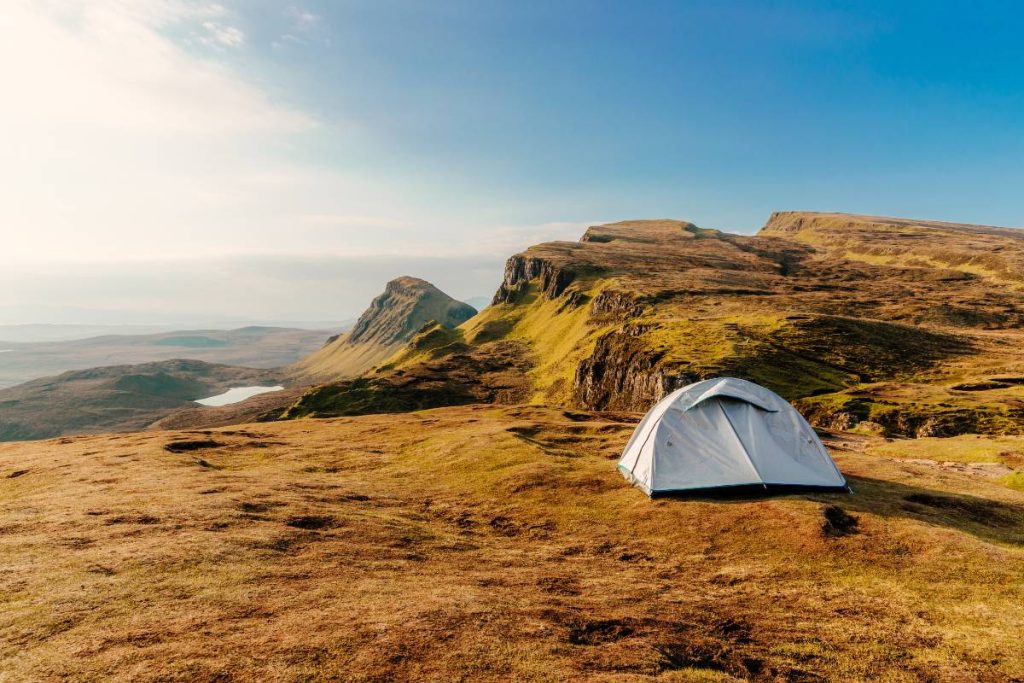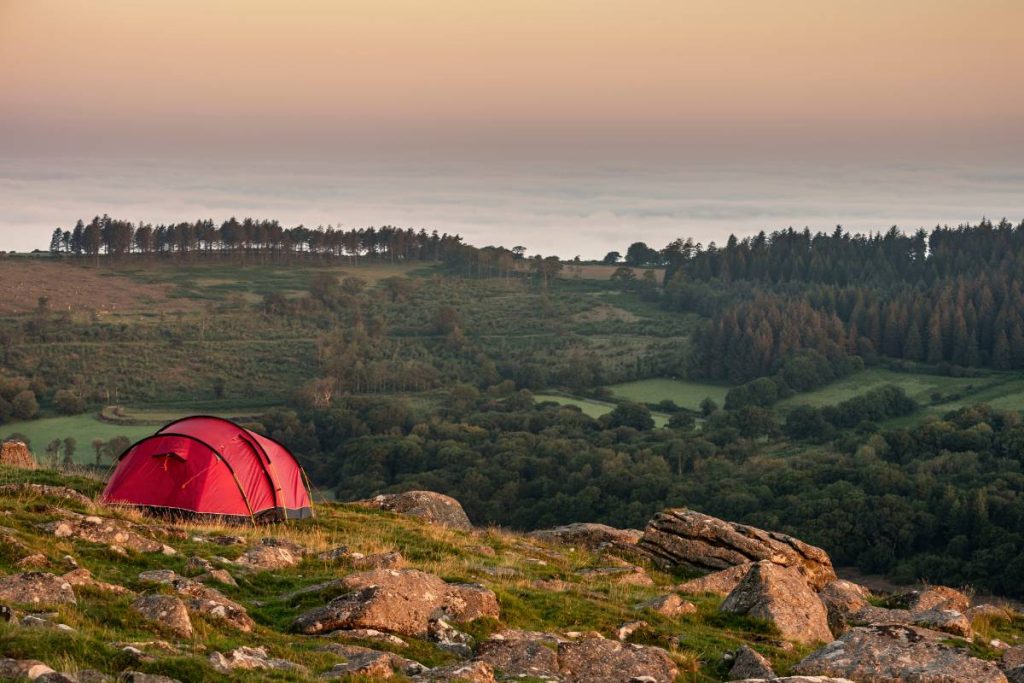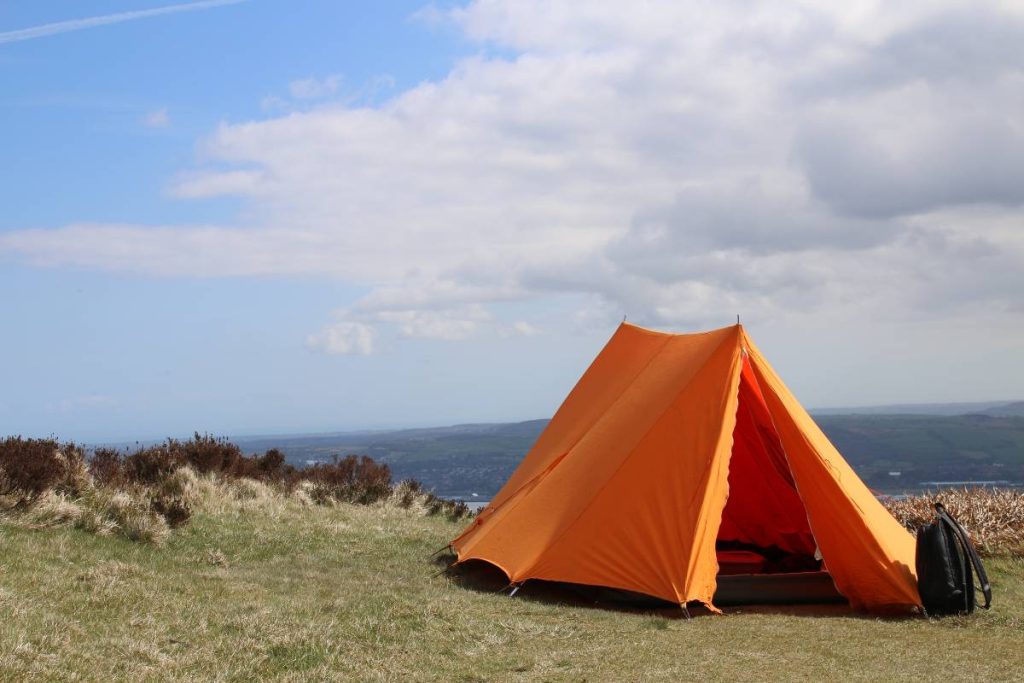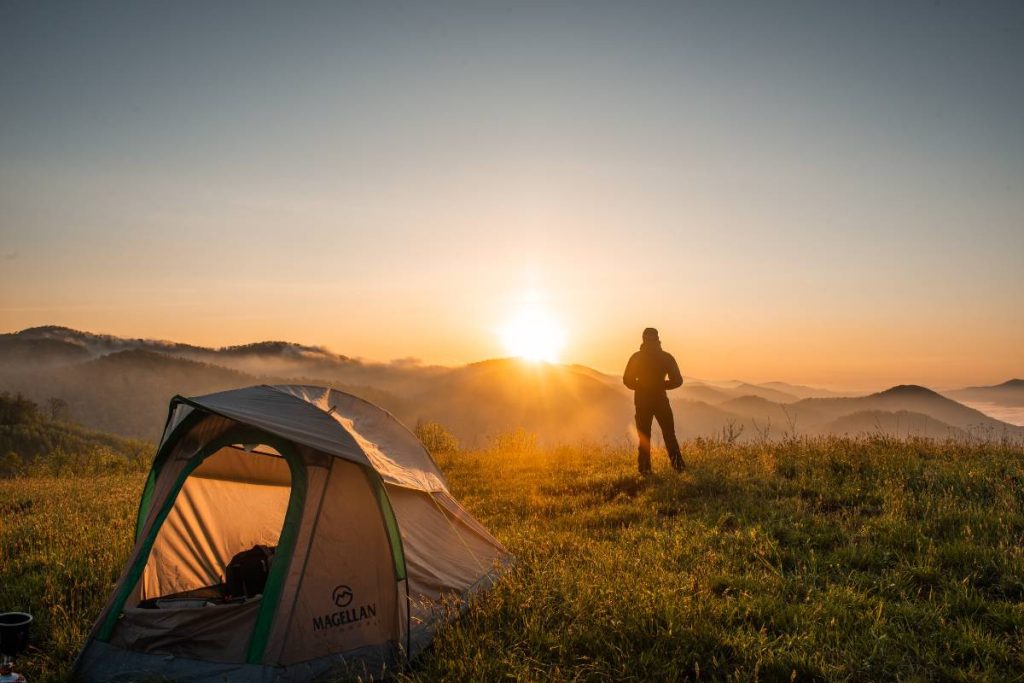Picture this: You’ve hiked deep into the hills, the sun’s dipping low, and there’s no one in sight. The wild moors roll endlessly in every direction, and your tent waits in your rucksack, eager to be unfurled. You pause and ask yourself – can I camp here legally?
If you’ve ever wanted to ditch the campsites, escape the noise, and spend the night truly immersed in nature, wild camping probably calls to you. But in the UK, the answer to “can you camp anywhere?” isn’t straightforward – it’s wrapped in layers of land law, ancient rights, local politics, and growing conservation concerns.
In this comprehensive guide, we’ll unpack everything you need to know about where you can (and can’t) wild camp in the UK in 2025 – legally, respectfully, and safely.
Contents
- Is Wild Camping Legal in the UK?
- Scotland: The Holy Grail of Wild Camping
- Dartmoor: England’s Last Legal Wild Camping Frontier
- England, Wales, and Northern Ireland: What’s the Law?
- Understanding “Stealth Camping”
- What Happens If You Get Caught?
- How to Ask for Permission (And Actually Get It)
- Alternatives to Wild Camping (That Still Feel Wild)
- Why Wild Camping Matters – And Why It’s Worth Protecting
- Final Thoughts: Can You Camp Anywhere in the UK?
Is Wild Camping Legal in the UK?
Let’s start with the big picture: no, wild camping is not legal across most of the UK – unless you’re in Scotland. In England, Wales, and Northern Ireland, wild camping is typically only lawful if you obtain the landowner’s permission.
That means pitching your tent without permission, even in seemingly remote or uninhabited areas, usually amounts to civil trespass. While it might not lead to immediate arrest or hefty fines, it’s not a legal right – and being asked to leave is always a possibility.
Yet, the reality is nuanced. Some places tolerate it. Others fiercely protect against it. And in a few, like Dartmoor National Park, the law is finally swinging in favor of public access.
Scotland: The Holy Grail of Wild Camping
If you’re dreaming of sleeping under the stars without fences, fees, or fuss – Scotland is your sanctuary.

Thanks to the Land Reform (Scotland) Act 2003, wild camping is explicitly permitted as part of the country’s long-standing right to roam. This law gives you the freedom to camp on most unenclosed land, including hills, moorlands, and coastlines – as long as it’s done responsibly.
But what does “responsibly” mean in practice?
The Scottish Outdoor Access Code outlines clear guidance:
- Camp in small numbers (no large group gatherings)
- Stay for no more than 2–3 nights in one spot
- Pitch well away from roads, houses, and farmland
- Leave absolutely no trace when you go
This generous freedom is rooted in a cultural respect for the land. But with that trust comes responsibility. Over the years, Scotland has seen increasing pressure from careless “fly campers” – people leaving rubbish, lighting fires, or damaging sensitive ecosystems. In response, some regions now have seasonal restrictions or permit zones.
For example, in Loch Lomond & The Trossachs National Park, camping bylaws mean that between March and September, you need a permit to wild camp in certain areas. It’s a fair balance – access is still possible, but managed to protect the landscape.
So while Scotland remains the UK’s wild camping paradise, do your research and tread lightly.
Dartmoor: England’s Last Legal Wild Camping Frontier
Until recently, Dartmoor was the only place in England where wild camping was assumed to be a legally protected right. That changed in 2023, when a landowner challenged this assumption in court – sparking public outrage and a fierce legal battle.

But in May 2025, a landmark Supreme Court ruling swung the pendulum back toward public access. The court affirmed that wild camping is indeed a lawful form of open-air recreation under the Dartmoor Commons Act 1985. In other words, you can wild camp legally on Dartmoor’s common land, without needing permission.
However, the ruling comes with reasonable conditions:
- You must arrive on foot or horseback – no driving up and setting up base (perfect if you’re camping without a car).
- Only camp in designated areas mapped by the Dartmoor National Park Authority.
- Keep group sizes small and durations short.
- Respect the land, livestock, and other visitors.
This decision isn’t just about Dartmoor. It’s about a wider movement. Campaigners now argue that this model – legal, responsible access – should extend across other national parks and open-access land in England and Wales. Whether the government will follow through remains to be seen, but the Dartmoor victory has ignited hope.
England, Wales, and Northern Ireland: What’s the Law?
Outside Scotland and Dartmoor, wild camping in the UK gets legally murky.
In general:
- You’re not allowed to camp on private land without permission.
- That includes open moorland, woods, beaches, and national parks – even if they seem public or unused.
- By camping without permission, you’re committing civil trespass.
This might sound intimidating, but context matters. In remote upland areas – like parts of the Lake District or Snowdonia – many campers do stay overnight discreetly. Often, as long as you arrive late, leave early, and remain invisible, no one will bother you. But it’s not a right – and there’s always a risk of being moved on.
Some places, especially those under environmental protection (like Sites of Special Scientific Interest) or those frequently abused by careless campers, are more actively patrolled. Fires, litter, or camping near homes can quickly escalate the situation into a criminal matter.
In short: Wild camping without permission isn’t legally allowed in England, Wales, or Northern Ireland – but it’s sometimes tolerated if done respectfully and discreetly.
Understanding “Stealth Camping”
Stealth camping is the grey zone many adventurers quietly inhabit. It means camping without permission, with the goal of leaving no evidence you were ever there.

You’ll often hear of hikers, cyclists, and solo wanderers “stealth camping” in woodlands, hedgerows, or secluded corners of public paths. They:
- Arrive at dusk, leave at dawn
- Use low-profile gear (dark green tents, hammocks, tarps)
- Stay one night only
- Avoid lights, fires, or loud noise
Legally, stealth camping is still trespassing. But ethically, it’s closer to a tradition – rooted in quiet respect for the land.
Problems arise when stealth becomes sloppy. Setting up early, leaving waste, or overstaying quickly turns public sympathy into hostility. That’s why many outdoor veterans promote the principle of “invisible camping”: Be so low-impact that even the sheep don’t notice you were there.
What Happens If You Get Caught?
If you’re discovered wild camping where it’s not permitted, most likely, you’ll be asked to leave. The law doesn’t allow landowners to detain or fine you for civil trespass. Police rarely get involved unless things escalate.
However, there are cases where camping becomes a criminal offence:
- If you refuse to leave when asked
- If you damage property, dig fire pits, or disturb livestock
- If you camp in restricted or protected areas
Under the Criminal Justice and Public Order Act 1994, unauthorized encampments – particularly by groups – may face fines or police action. Littering, fire use, or public nuisance can also lead to fixed penalties.
But here’s the truth: Most respectful solo campers will never see a courtroom. If you camp considerately, you’re likely to be met with a nod or at worst, a polite request to move on.
How to Ask for Permission (And Actually Get It)
It might feel awkward, but asking landowners for permission can be surprisingly successful. Many farmers and estate owners appreciate being asked – and often say yes to responsible campers.
The key is sincerity and simplicity. Approach with humility and explain what you’re doing:
“Hi there – I’m doing a quiet, one-night wild camp. I won’t light fires or leave anything behind. Would you be okay with me pitching my tent for the night?”
Be friendly. Offer to leave if it’s not okay. Thank them either way. This human connection often opens doors that maps and apps can’t.
And who knows – you might even be pointed to a hidden gem of a spot most people would never find.
Alternatives to Wild Camping (That Still Feel Wild)
If you love the idea of wild camping but don’t want to bend rules or risk confrontation, there are brilliant alternatives that give you the same immersion – legally.
Nearly Wild Camping
A network of small, low-impact campsites across the UK – often tucked into woods, meadows, or riverbanks. They offer little to no facilities, but all the charm of wild camping, with landowner permission. Great for solo adventurers or families alike.
Check out: nearlywildcamping.org
Pop-Up Farm Campsites
Some farms offer seasonal or event-based camping spots – think hay meadows in summer or woodland retreats with compost loos and fire pits. You pay a small fee, enjoy peace of mind, and still get the wild feel.
Apps like Hipcamp UK or Greener Camping Club are perfect for finding these hidden gems.
Wild-Style Van Camping
For vanlifers or car campers, apps like Park4Night or Search for Sites help locate tolerated overnight spots – from forestry car parks to lay-bys with views. Just make sure you follow local bylaws and leave no trace.
Why Wild Camping Matters – And Why It’s Worth Protecting
Wild camping isn’t just about avoiding campsite fees. It’s a gateway to connection – with nature, solitude, and the rhythms of the land.

In an age of noise and rush, sleeping under the stars can be healing. It teaches resilience, respect, and minimalism. But it’s also under threat – from overuse, disrespect, and restrictive land policies.
The Dartmoor ruling in 2025 has reinvigorated the push to make wild camping more accessible across the UK. Outdoor groups, conservationists, and freedom-to-roam campaigners are uniting to show that responsible access enhances, rather than harms, our shared landscapes.
If we all do our part – tread lightly, camp ethically, speak respectfully – the right to wild camp could someday extend far beyond Dartmoor and Scotland.
Final Thoughts: Can You Camp Anywhere in the UK?
Legally? No. Practically? Sometimes. Responsibly? Always.
Here’s the breakdown:
- Scotland: Wild camping is fully legal and protected – but only if done respectfully.
- Dartmoor: Wild camping is legal on Dartmoor Commons, thanks to a 2025 Supreme Court ruling.
- Rest of UK: Wild camping is unlawful without permission, though often quietly tolerated if done discreetly.
- Stealth camping: A personal choice, but not a legal right – tread carefully.
- Permission-based camping: More doable than you think. A polite ask can unlock amazing places.
- Alternatives: Nearly Wild Camping and pop-up sites offer authentic wildness, legally.
So no, you can’t camp just anywhere – but with a bit of research, courtesy, and care, the UK’s natural beauty is yours to enjoy.
